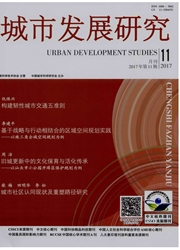

 中文摘要:
中文摘要:
人的城镇化,强调包容性发展,这是新型城镇化的发展方向,如何使农民工融入城市,与持有城镇户口的居民一样享有同等的发展机会和共享发展成效,成为推动城镇化健康发展、解决人的城镇化的核心。因此需要首先了解哪些因素是制约农民工融入城市的因素。中国的改革开放走过了近40年的历史,农民工也出现了两代人,他们的需要是不一样的。基于重庆市两代农民工样本的调查,通过构建Probit模型对影响两代农民工城市融入的因素进行了分析,发现年龄、受教育年限、职业类型、住房类型、居住环境、住房评价、农村老家是否有承包地等7个因素直接影响第一代农民工的城市融入状况;而受教育年限、职业类型、居住环境、是否有子女在务工城市上学等4个因素影响新生代(或第二代)农民工的城市融入状况。根据两代不同的农民工城市融入的代际差异,认为应当在住房、教育、土地方面实施差别化的政策,以推动农民工城市融入进程。政策建议包括:建立以公租房为核心的农民工住房保障体系和旧房非拆除性的改造,以改善农民工的人居环境;加强对新生代农民工的职业教育培训以适应产业发展;重视农民工子女在城市的教育公平;对农民工老家承包地和宅基地的流转要充分尊重其意愿。
 英文摘要:
英文摘要:
New-type of Urbanisation,or " People priority" emphasises inclusive growth in China. The involvement of rural-urban migrants in urban areas,which means sharing equal development rights,welfare benefits,similar to other urban Hukou residents,is the main force to push healthy urbanisation concentrating on people as its centre. Based on the sample questionnaire survey on the rural migrant workers in Chongqing,a Probit model is built to analyse different factors that affect rural-urban migrant workers' desire of staying urban areas or not. It is found that 7 factors,e. g.,age,education,professional type,type of housing,living environment,and their agricultural land in rural area affect the first generation of migrant workers' willingness to leave in the city. However,4 other factors including education,occupation,living environment and children's education in city affect the new generation migrant workers' desire of staying in the city. According to these differences of migrant workers,we suggest emphasizing issues of housing,education and land policy in new type of urbanisation. Public rental housing is expected to be the core approach for providing accommodation for rural-urban migrants and modification should be done to improve migrant workers living environment. The job training of new generation of migrant workers should be enhanced to adapt to economic transition. Equal opportunity in education in cities is significant. The willingness of agricultural land transfer should be fully respected.
 同期刊论文项目
同期刊论文项目
 同项目期刊论文
同项目期刊论文
 期刊信息
期刊信息
